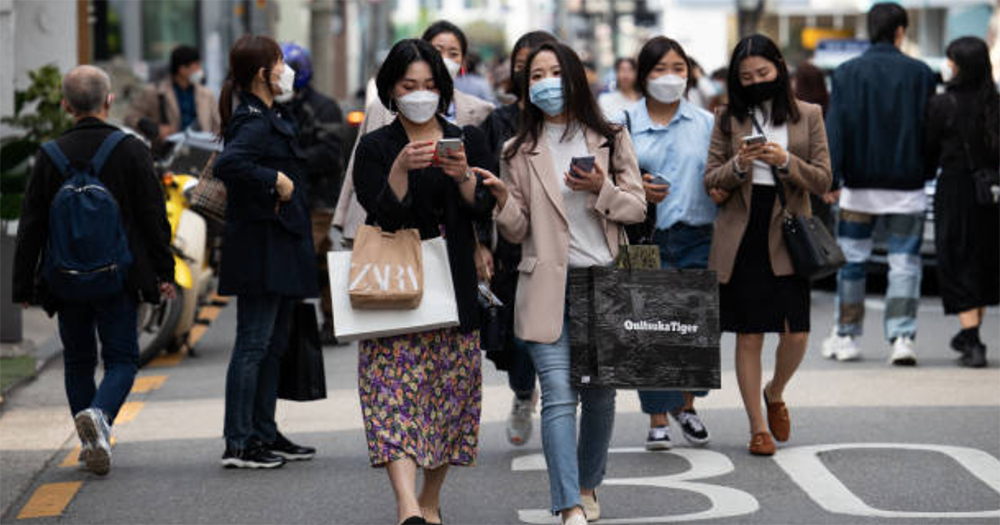South Korea has begun to ease its social distancing rules and re-opened parks, cafes, shopping malls, golf courses, and some restaurants, Reuters reported.
In addition, businesses have also begun to ease their work-from-home policies, although flexible working hours and the limitation of face-to-face meetings are still in place.
According to Yonhap, the South Korean government shut down all public facilities on Mar. 22, including schools and private gyms, in a bid to stem the spread of Covid-19.
The government then eased restrictions on Apr. 19 for churches, gyms, cram school and bars, with national parks and forests also set to re-open gradually.
South Korea's new cases are in the single-digit to low-double digit range
On Apr. 19, the country's Health Minister, Park Neung-hoo, attributed the fall in the number of new infections to the social distancing rules.
"The number of daily new infections, which hovered around 100 in the 10 days before the social distancing campaign took off, declined to below 50 on April 9. It fell to a single-digit figure in two months."
South Korea reported nine new cases of Covid-19 on Apr. 19, 13 new cases on Apr. 20, and 11 new cases on Apr. 21.
The highest number of cases reported in one day was 909 on Feb. 29.
Crowds appeared to have already returned to public spaces on Apr. 18
Bloomberg further reported that over the weekend, however, crowds had already returned to cafes, restaurants and parks on Apr. 18, stating that they believed the worst of the Covid-19 outbreak was over, despite pleas by the government to remain indoors.
Korea's Centers for Disease Control and Prevention had also urged the public to continue to adhere to social distancing and personal hygiene guidelines to guard against a "second wave" of infections.
@TheJihyeLee saw cafes and restaurants bustling with customers in South Korea on Saturday despite government pleas to remain indoors to curb the spread of the #coronavirus. More @business: https://t.co/6ABAzzgCgE #covid pic.twitter.com/WQoWYns8Wy
— Bloomberg Quicktake (@Quicktake) April 19, 2020
Bloomberg's assessment of public sentiment was markedly different from Yonhap which quoted a government poll, showing that 63 per cent of respondents opposed the immediate easing of social distancing measures.
The poll also showed 66.2 per cent of the respondents pointing to the risks of the virus resurfacing while a cure remains unavailable.
What are these social distancing measures that were implemented?
According to Vox, rather than resort to a large-scale shutdown, South Korea resorted to isolating groups of people who have been exposed.
This means that rather than imposing a shutdown across the entire country, groups of people who are suspected of being exposed have been targeted for isolation.
In addition, the country also has a robust contact-tracing system, with a high number of tests carried out for Covid-19.
According to the New York Times (NYT), South Korea has carried out over 300,000 Covid-19 tests, more than any other country in the world, which has enabled it to isolate people soon after they are infected.
The scale of the country's contact-tracing system is also described as relying to a greater extent on mass messaging, once the outbreak grew beyond the scale for effective tracking of patients.
Here is NYT's description of the infrastructure that South Korea has put in place:
"South Koreans’ cellphones vibrate with emergency alerts whenever new cases are discovered in their districts. Websites and smartphone apps detail hour-by-hour, sometimes minute-by-minute, timelines of infected people’s travel — which buses they took, when and where they got on and off, even whether they were wearing masks.
People who believe they may have crossed paths with a patient are urged to report to testing centers.
South Koreans have broadly accepted the loss of privacy as a necessary trade-off.
People ordered into self-quarantine must download another app, which alerts officials if a patient ventures out of isolation. Fines for violations can reach US$2,500.
By identifying and treating infections early, and segregating mild cases to special centers, South Korea has kept hospitals clear for the most serious patients. Its case fatality rate is just over one percent, among the lowest in the world."
Top photo by SeongJoon Cho/Bloomberg via Getty Images
If you like what you read, follow us on Facebook, Instagram, Twitter and Telegram to get the latest updates.
